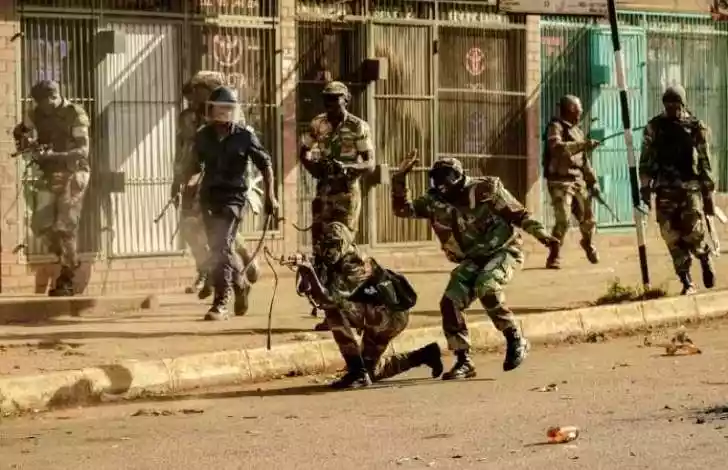
ON Wednesday May 24, 2023, I joined a panel of human rights defenders to reflect on the problem of organised violence and torture in Zimbabwe.
This was during the launch of the report A Short History of Organised Violence and Torture in Zimbabwe (1972-2020).
The report exposes one of the worst evils of humankind going back to the pre-colonial era.
It shows that nothing has changed since the so-called second republic.
It shows the power of violence in making the people powerless.
The report, as the title suggests, covers a period of mass violence from 1972, the substantive beginning of the liberation war that brought independence to Zimbabwe.
Based on series of previous reports released during 2020 and 2021 by a consortium of Zimbabwean human rights organisations — the Zimbabwe Human Rights NGO Forum, Counselling Services Unit, Heal Zimbabwe Trust, Research and Advocacy Unit, and Veritas — the consolidated report makes very sad reading.
The report obviously considers the organised violence and torture (OVT) during the 1980s, the so-called Gukurahundi, but also provides data on periods of mass displacement, such as Operation Murambatsvina and the fast-track land reform programme.
- Ziyambi’s Gukurahundi remarks revealing
- Giles Mutsekwa was a tough campaigner
- New law answers exhumations and reburials question in Zim
- Abducted tourists remembered
Keep Reading
A very substantial portion of the report deals with the OVT that has taken place during Zimbabwean elections since 2000, and this has great relevance to 2023 as Zimbabwe heads towards yet another election in which the stakes are higher than ever before.
It also profiles the attempts made by civil society to provide assistance to the tens, perhaps hundreds of thousands of victims and survivors over the past 50 years.
And, finally, the report demonstrates the lack of change since the coup in 2017 and the so-called new dispensation.
I reflected that the report is an indictment on us as a people.
It shows the failure of the liberation agenda as ordinary people still live in fear of their government under oppression.
They cannot exercise their fundamental rights. I reflected that instead of celebrating 10 years of a progressive Constitution, we must hide in shame as this report shows our failure to build the Zimbabwe envisioned in the 2013 Constitution.
Looking forward, I believe the report is evidence of the urgent need for transitional justice in Zimbabwe. Zimbabwe is a member of the African Union.
In 2019, together with other African States, Zimbabwe committed to implementing the African Union Transitional Justice Policy Framework. Years down the line, nothing has been done.
Having worked very hard in support of the National Peace and Reconciliation Commission (NPRC) the report makes me ashamed at the realisation that our conflict prevention mechanisms have dismally failed to tame the monster called violence.
After gobbling the taxpayers’ money for 10 years, the NPRC has nothing to point at except expensive Range Rovers.
The impetus for transitional justice began 20 years ago, at a ground-breaking conference in South Africa: Civil Society and Justice in Zimbabwe.
This conference began a strong campaign for transitional justice, emphasising the need to focus on the period beginning in 1965.
The search for transitional justice was likely an influence on the NPRC being established in the 2013 amended Constitution, and led to the formation of the National Transitional Justice Working Group (NTJWG) in 2014.
The NTJWG has assiduously pressured the NPRC and the government to make real on all the promises to deal with transitional justice, with little effect.
Upon the ashes of the NPRC, a people-led transitional justice movement must rise.
We must acknowledge that we have given the current state an opportunity to implement transitional justice through the NPRC and it has failed.
It has failed because it is a perpetrator State with neither will nor the capacity to deal with the violence that it believes in.
Anyone who believes that even traditional leaders’ transitional justice work under the current state will thrive is deluded.
There is evidence that transitional justice in any form is not needed by the current state.
Justice minister Ziyambi Ziyambi told the UN Human Rights Council recently that Gukurahundi was resolved.
But as activists, we must also reflect. The report celebrates the work of civil society in documenting OVT in Zimbabwe.
I acknowledge that, but more robust introspection is needed.
I worry that even as civil society, we have been tamed over the years by over-professionalism.
We have in a way contributed to the disempowerment of the communities we are working in.
We must shift the power back to the people. We must bring back citizen power to the conversation on human rights and transitional justice.
I miss the good old days when the Education minister would think twice before increasing school fees because thousands of angry parents would besiege government offices demanding a reduction.
That was because people power was real. We must, as activists, go back to a struggle approach to human rights, acknowledging that human rights originated from and are ultimately guaranteed by legitimate resistance.
The human rights struggle today is a liberation struggle, just as important as the struggle that brought national independence.
The difference is that this is a struggle that we choose to wage without violence, because we are seeing violence destroying everything that we ever hoped to build during independence.
The new report A Short History of Organised Violence and Torture in Zimbabwe (1972-2020) reminds us today that the work of liberation is ongoing, and we must double our efforts on all fronts.
It reminds us not to allow ourselves to get used to the ugly reality of violence.
We must raise our voices against violence, even as our voices shake.
- Dzikamai Bere is a Zimbabwean human rights activist, peace worker and transitional justice expert. He writes here in his personal capacity.








